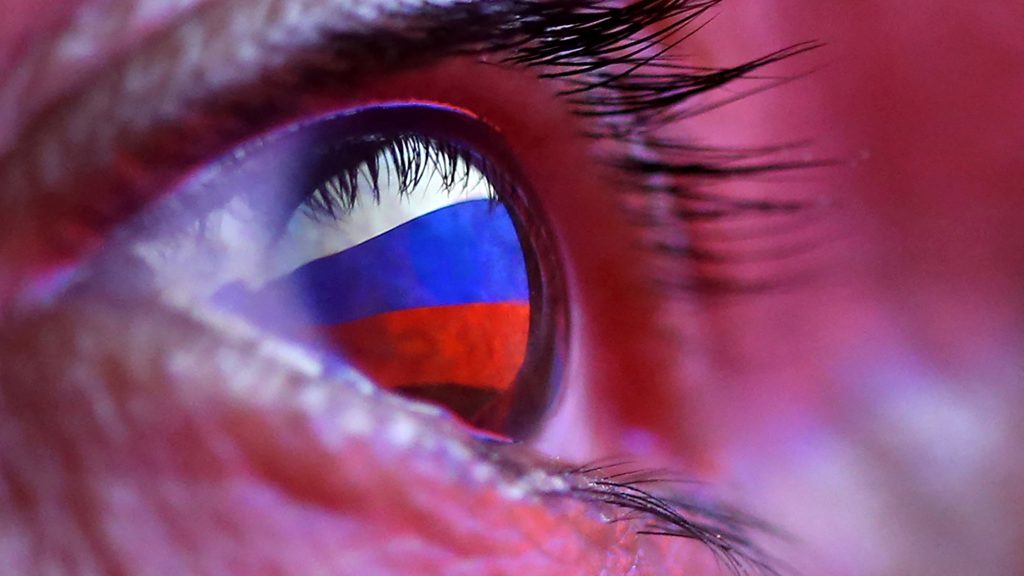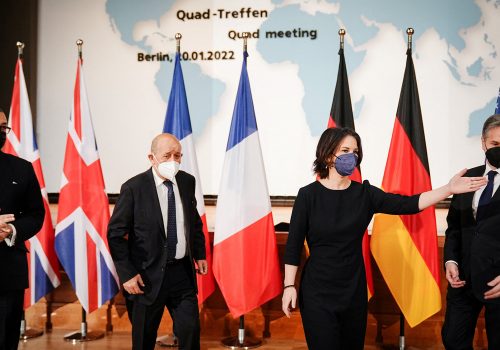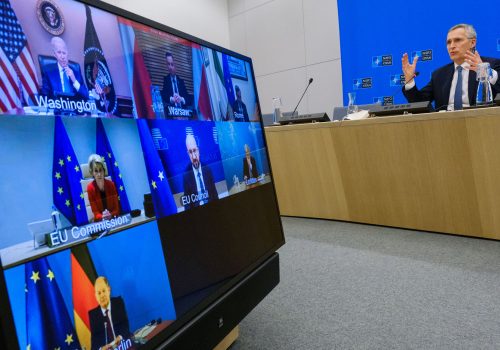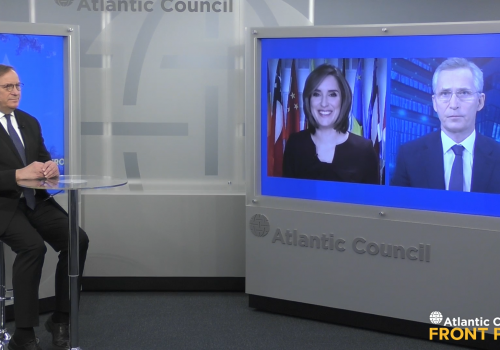The world is living through times of distress and retrospective awareness. In the face of widespread speculation regarding Russian President Vladimir Putin’s movements, the frequency with which the post-World War II period finds its way into common conversations is noteworthy. More so than the 1945 Yalta Conference, the fall of the Soviet Union in 1991, or Russia’s annexation of Crimea in 2014, the Atlantic Charter (signed by US President Franklin D. Roosevelt and British Prime Minister Winston Churchill aboard the USS Augusta in 1941, when the war’s outcome was still uncertain) assumes special meaning: It documents, for the first time, the ambition to build a world in which people live with “freedom from fear and want,” the commitment to prosperity as a preferred path to peace. These are principles that constitute the pillars of the international liberal order which has governed for the last eight decades; they have cemented American hegemony under its slogan of “the Free World.”
Beyond the opinion of experts and the racket of those who (although lacking credentials) make proclamations and predictions about this crisis, what has been worrying the ordinary citizen in Europe are questions about when and how the tension will come to a head. The question of whether there will be war, although valid, is losing urgency, while diplomacy is seeming to take shape after the delivery of Washington’s and NATO’s responses to Russia’s ultimatum presented on December 17.
This point of view can give the (false) sensation that, as the possibility of an invasion recedes, the West can return to its routines. Ukraine is not in NATO, and the thirty members of the Alliance—including the United States—have made it clear to the world that in no case do allies foresee sending troops to defend a “distinctive partner” (but not an ally). An open confrontation between Ukrainians and Russians cannot be ruled out; nor should it be forgotten that over fourteen thousand people have died in combat in the Donbas. In the event of a hypothetical escalation in Russian aggression, a military response would be Kyiv’s business. Altogether separate are the shipments (of materiel, trainers, and other bilateral support) from NATO members (mainly from the Baltic countries, the United States, the United Kingdom, and Canada).
The question is whether against this backdrop, the West should be able to “rest easy.” It should not. Start with Spain: It is tempting (especially because of geographical distance) to believe that the situation in Eastern Europe does not concern Spain. For Spain, it would also be easy, taking stock of only national interests, to proclaim an empty “no to war” to check a box in internal politics. But Spain’s contribution of two ships to the NATO operation—aimed at guaranteeing free navigation in the Black Sea and at projecting unity and strength—is a decision in line with the country’s NATO membership and history. It is part of the reversal of Spain’s distancing from the United States since 2004.
Broadening the focus, as US President Joe Biden (quite frankly) pointed out in his much-discussed press conference on January 19, Putin “has to do something.” After such extensive saber-rattling, it is difficult for him to back down empty-handed. In December, Putin threatened to respond with “adequate military-technical response measures;” his spokespersons have not clarified much, beyond Russian Foreign Minister Sergei Lavrov’s cryptic definition on January 14: the measures “imply the deployment of military hardware, it is obvious.”
Without falling into the trap of over-simplification, it is important to note that Putin highlights the difference between “us” (the Slavs, particularly applicable to Ukraine—historically referred to as “Little Russia”—and Belarus—historically referred to as “White Russia”) and the West. The article he published on July 12, 2021, where he posits that Russians and Ukrainians constitute “one people,” also deserves a mention. Putin has made known his admiration for the greatness of the tsars of Russia, who identified security with territorial control (in the Russian Empire’s last four hundred years, it grew, on average, by fifty square kilometers a day). The West is well-acquainted with his coercive diplomacy: warnings, signals, and demands backed by a show of offensive capabilities and resolve. Keeping all this in mind, it follows that a democratic, prosperous Ukraine, integrated in the West, would represent a (dangerous) counterpoint to Moscow’s system of government.
But limiting the analysis to Ukraine would be making the mistake of reducing the issue to mere geography. It is time for the West to take its head out of the sand and to take measure of the potential global consequences of this crisis. The outcome, whatever it may be, will affect Europe’s security architecture, the future of NATO, and the transatlantic alliance. It will also have repercussions for the United States—notably, in the relationship with China that Washington has established as a touchstone of its foreign policy after leaving Afghanistan and shelving the War on Terror. A country’s sovereignty, territorial integrity, and freedom to choose its own destiny are some of the bastions of the international system—now in question—that the world established and that the West has the responsibility to preserve.
This system—the liberal order—has deep philosophical roots to German philosopher Immanuel Kant. And Europeans have co-starred in its consolidation. However, since the United States emerged as a major global actor at the end of the nineteenth century, it has shaped the evolution of world governance through the development of its grand strategy: in opposition to the historical European spheres of influence and confined empires, the US vision (embodied in the Atlantic Charter) is founded on an open, rules-based world. Democracy and the rule of law underpin US interests; shared prosperity redounds to its advantage.
Washington has historically benefitted from a permanent mix of magnanimity and selfishness; the disastrous departure from Afghanistan and its disparagement of continental Europeans via the AUKUS defense pact are recent examples of the United States having forgotten the core principles previously mentioned. However, it must be stressed that in recent weeks, the Ukraine crisis has brought the world back to the open-mindedness that underlies the Atlantic Charter.
On January 28, in a virtual dialogue held by the Atlantic Council, NATO Secretary General Jens Stoltenberg underlined repeatedly the United States’ and Europe’s mutual necessity; he highlighted it as the main message to convey at the Alliance’s summit in Madrid in June, where its new Strategic Concept will be adopted. Maintaining unity between the two shores is an existential challenge—one that must be confronted with realism, generosity, and resolve.
A version of this article originally appeared in El Mundo. It has been translated from Spanish by the staff of Palacio y Asociados and is reprinted here with the author’s and publisher’s permission.
Ana Palacio is a former minister of foreign affairs of Spain and former senior vice president and general counsel of the World Bank Group. She is also a visiting professor at the Edmund E. Walsh School of Foreign Service at Georgetown University and a member of the Atlantic Council’s Board of Directors.
Further reading
Thu, Jan 20, 2022
How Europe can reclaim its voice in the Russia crisis
New Atlanticist By
“There will be no peace in Europe if the States are reconstituted on the basis of national sovereignty.” This warning by Jean Monnet sums up the crisis Europe is currently experiencing nearly eighty years later.
Fri, Jan 28, 2022
Experts react: The view from European capitals as consensus emerges against Russia
Experts react By
Which EU member states will rise to the challenge from Russia? The Atlantic Council's Europe Center experts weigh in with views from across the continent.
Fri, Jan 28, 2022
NATO chief on Russia crisis: We’re ready for anything
New Atlanticist By
NATO Secretary General Jens Stoltenberg believes the Alliance is fully prepared for the Kremlin's next move.
Image: A Russian flag is reflected in an eye in this picture illustration taken October 4, 2018. Photo via REUTERS/Dado Ruvic.



